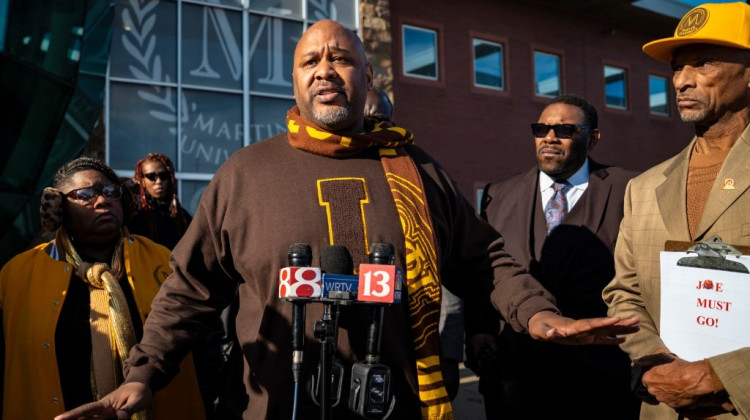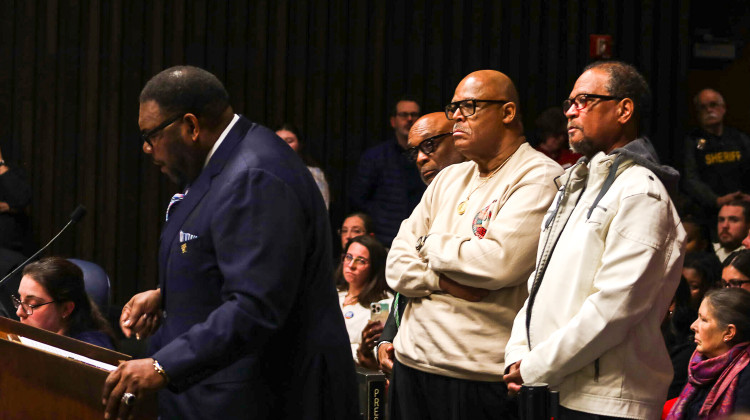
Indiana Learns is a grant program approved in Indiana's last legislative session. Lawmakers allocated $15 million to support the pilot program from October to June 2024 from the state's federal pandemic stimulus funds.
Wikimedia CommonsRoughly 57,000 Hoosier fourth and fifth graders with below grade-level math and English scores are eligible for a new statewide tutoring program that would provide their families up to $1,000 to pay for tutoring. But the pilot program created by lawmakers earlier this year will only be able to serve a portion of eligible students.
“We're going to do everything possible in Indiana to support our schools and our teachers,” Secretary of Education Katie Jenner said in an interview with WFYI. “Then also supporting our families and our parents who are so key to the education of their child. Making sure we're putting resources in their hands and connecting them to qualified tutors to further help support their children.”
The program
Indiana Learns is a grant program approved in Indiana's last legislative session. Lawmakers allocated $15 million to support the pilot program from October to June 2024 from the state's federal pandemic stimulus funds, known as Elementary and Secondary School Emergency Relief or ESSER.
The goal is to support students who fell behind during the pandemic, as determined by third and fourth graders who scored below proficient on the spring 2022 math and English/language arts state standardized exam. Only around a third of students in both grades passed these two parts of the test.
To be eligible, students must also be enrolled at a traditional public, charter or accredited private school and qualify for free or reduced lunch.
Students approved for the program will receive an initial $500 from the state. A student's school or district can choose to provide an additional $250. When that happens, the state will match the amount from the school district for a potential $1,000 total.
The grant is maintained by the state and doesn’t go directly to a family.
The funds can be used on pre-approved virtual and in-person tutoring services with organizations that have hired current or retired teachers or students in a teacher-prep program to serve as tutors, such as Tutored by Teachers, a national group the Indianapolis Public Schools district has worked with recently.
Tutoring servicers are asked to provide weekly updates to families and schools so student progress can be tracked.
Students can participate in a five-to-10-week tutoring program for a minimum of one hour each week outside of regular school hours — after school, during school breaks and during the summer.
The Indiana Department of Education, which is in charge of the funds, contracted with The Mind Trust — an Indianapolis-based education nonprofit — to operate the program. The state will provide The Mind Trust with contact information for students who qualify for the program to directly notify those families.
“The idea [is] that we are building a triangle between families, providers and schools so that all three of those entities are communicating on what's in the best interest of the child in ways where parents actually have real voice and agency in making those types of determinations,” said Seana Murphy, senior director of Indiana Learns.
Murphy said hiring a tutor can cost up to $100 an hour. The state grant, she said, can address the financial resource gap that prevents low-income families from providing their students with needed academic support.
“The longevity of that type of relationship and the importance of that type of relationship cannot be over spoken,'' Murphy said. “Parents who are feeling power in those ways, I believe, will be more apt to stay engaged with [their child’s] learning.”
Even if not all eligible students apply, the state only has funds to support about 15,000 to 24,000 students, depending on the amount of schools who use their district’s federal relief funding to provide the financial match.
But Jenner said she hopes the program will be expanded in the future. She said the IDOE will work to secure additional federal or state funds if more than 15,000 eligible students apply.
How to apply
Families can register at IndianaLearns.org. Tutoring services will be available on the portal by Oct. 1.
Contact WFYI education reporter Elizabeth Gabriel at egabriel@wfyi.org. Follow on Twitter: @_elizabethgabs.
 DONATE
DONATE







 Support WFYI. We can't do it without you.
Support WFYI. We can't do it without you.